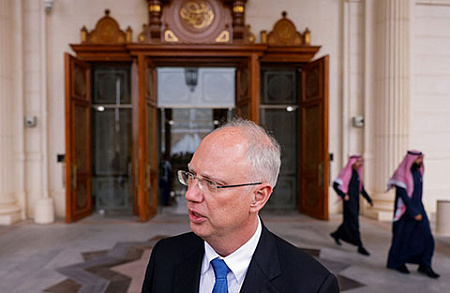
US sanctions against Kirill Dmitriev, head of the Russian Direct Investment Fund (RDIF), have been temporarily lifted, according to US media. This was done so that he could hold talks in the United States with Steve Witkoff, the special representative of Donald Trump. The White House is demonstrating dissatisfaction with the pace of progress in the negotiation process with the Russian Federation. And the US allies are setting themselves up for the fact that there will be no peace soon, and Ukraine will have to provide weapons for a long time.
The CBS television company, citing sources, reported that the meeting between Dmitriev and Witkoff will be held at the White House on April 2. At the time of signing the issue, it had not taken place and there was no official confirmation that it would take place there. Dmitry Peskov, the press secretary of the President of the Russian Federation, only confirmed that Dmitriev’s visit was possible. The head of the Russian Direct Investment Fund has been under US sanctions since 2022.
Despite this, he is actively involved in the negotiation process with the United States. In February, he participated in the Russian-American talks in Riyadh. Businessman Dmitriev was in contact with businessman Witkoff, a man very close to Trump. Apparently, this format of interaction is most hoped for by the current US president, who appreciates and understands the logic of transactions based on mutual benefit.
Despite the criticism of Witkoff, which is heard in the American media, Trump does not seek to transfer the Russian-Ukrainian peace settlement to the jurisdiction of the one who, it would seem, should be responsible for him – the special representative of the President of the United States for Ukraine, Keith Kellogg. He finally switched to contacts exclusively with official Kiev. Apparently, he didn’t even get the role of the “bad cop” in the dialogue with Moscow. It was staked out by representatives of the Republican Party factions in both houses of Congress. A bipartisan bill has been submitted to the Senate (25 Republican senators and 25 Democratic senators) on the imposition of sanctions against the Russian Federation in case negotiations on a truce with Ukraine are delayed. These new sanctions, the first during Trump’s tenure as president, involve the imposition of duties of 500% for countries that purchase, as stated in the explanatory note, “Russian oil, gas, uranium and other products.”
Is this feasible in practice? Among the countries that actively purchase Russian energy resources, there are not only relatively small states, but also China, as well as India, with which the United States is actively establishing ties, trying to make it its key ally in the Indo-Pacific region. Will the American authorities go to such large-scale trade wars? Trump has so far shown confidence that they will go. The senators’ initiative is in line with his promise to impose unprecedented tough sanctions against Russia if Moscow delays the negotiation process. In an interview with NBC News, Trump stated that he could impose additional duties on 25-50% of Russian oil buyers and thereby deprive them of the opportunity to do business in the United States.
At the same time, the EU defense ministers, who met in Warsaw on April 2 for an informal meeting (it will take two days), expressed skepticism about the prospects for an early peace between Russia and Ukraine. According to the agenda of the event and the statements made by its participants, it does not follow that Europe intends to reduce the pace of military support for Kiev. On the contrary, they are likely to be increased in accordance with the proposal of the EU High Representative for Foreign Affairs and Security Policy, Kai Kallas. She proposed to transfer 2 million shells to Ukraine in 2025 for a total amount of 5 million euros, using the principle of voluntariness instead of distributing the responsibility for supplies to each of the EU countries depending on its GDP. Practice shows that the latter extends the delivery time of weapons to Ukraine. The fact is that not all EU countries have developed military-industrial complexes.
The defense ministers probably also discussed the possible deployment of their military to the Russian-Ukrainian conflict zone after its end. There are few people willing to participate in the “coalition of the resolute,” as it is called in the West, but they are there. It is expected that this issue will be one of the main ones at the upcoming meetings of defense ministers of Ukraine’s allied countries: in particular, at the Ramstein format meeting, which will be held on April 11 under the chairmanship of the United Kingdom.
